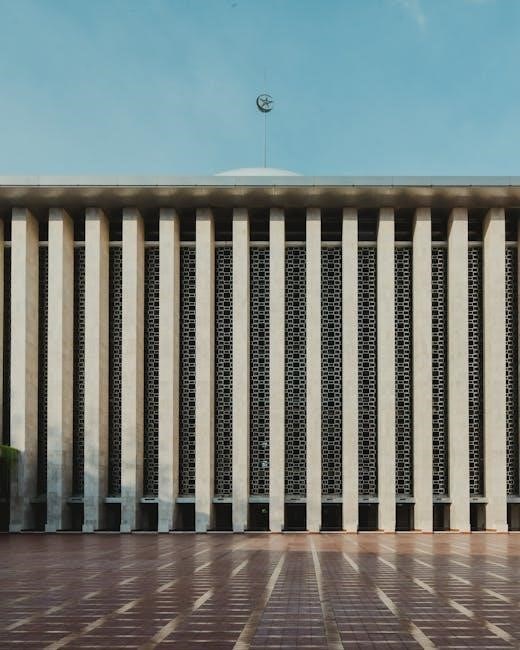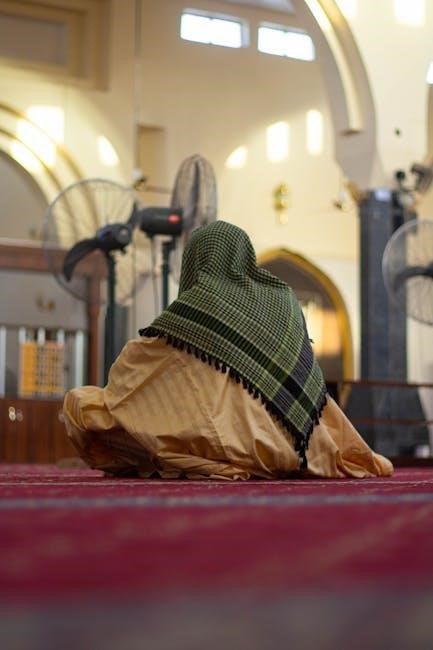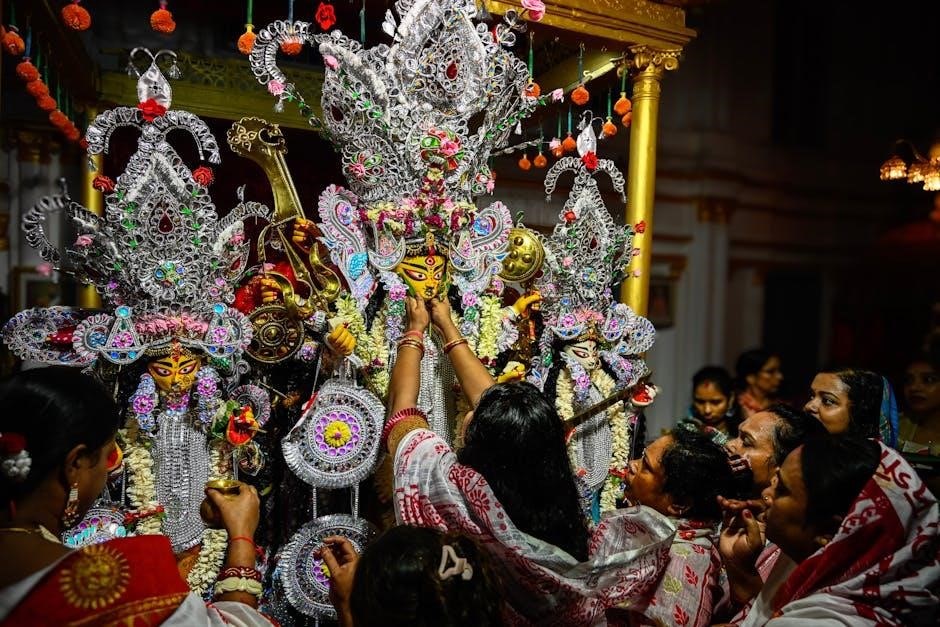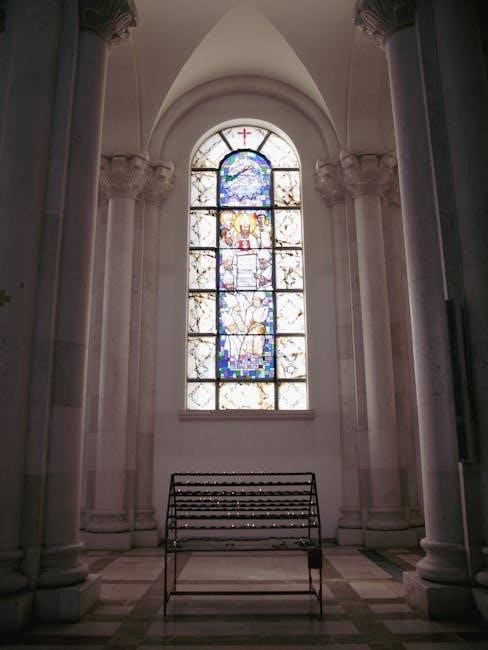
janaza prayer dua pdf
Janaza Prayer is a sacred Islamic obligation, offering a final farewell and supplication for the deceased. The Janaza Prayer Dua PDF provides a comprehensive guide, ensuring proper execution and understanding of this vital ritual.
Overview of Janaza Prayer
The Janaza Prayer, or Salatul Janazah, is a communal obligation in Islam, performed to seek forgiveness and mercy for the deceased. It consists of four Takbeers, the recitation of Thana, Surah Fatiha, Durood, and a dua for the deceased, all recited silently. The prayer is led by an Imam, with the congregation following silently. It is performed standing, without Ruku or Sujood, emphasizing its unique nature. The Janaza Prayer Dua PDF provides a detailed guide, including Arabic text, English translations, and transliterations, ensuring proper execution. This prayer is a final act of respect and supplication, fulfilling a communal duty and bringing comfort to the deceased’s soul. Its significance lies in its role as a collective effort to seek divine mercy and forgiveness.
Importance of the Funeral Prayer in Islam
The Janaza Prayer holds profound significance in Islam as a collective act of worship and mercy. It is a final opportunity for the Muslim community to honor the deceased and supplicate for their forgiveness. Performing the prayer is considered a collective obligation (Fard Kifayah), emphasizing communal responsibility. Through this prayer, believers seek divine mercy for the deceased and strengthen their bond with the community. The Janaza Prayer Dua PDF serves as a practical guide, ensuring the correct recitation of supplications and maintaining the prayer’s sanctity. This prayer reflects Islam’s emphasis on compassion, unity, and spiritual support, even in the final moments of a believer’s journey.

Significance of Janaza Prayer
The Janaza Prayer is a vital Islamic ritual, reflecting compassion and unity. It seeks divine forgiveness for the deceased and provides spiritual closure for the community. Janaza Prayer Dua PDF guides believers in performing this sacred obligation with proper etiquette and supplications, ensuring its sanctity and collective benefit. It embodies Islam’s emphasis on shared responsibility and mercy.
Obligatory Nature of the Prayer
Obligatory Nature of the Prayer
The Janaza Prayer holds an obligatory status in Islam, emphasizing its importance as a collective duty. It is a Sunnah of the Prophet Muhammad (peace be upon him) and reflects the community’s shared responsibility. Attending the prayer is not just a recommendation but a duty that ensures the deceased receives a dignified farewell. The obligation underscores the Islamic principle of unity and compassion. Janaza Prayer Dua PDF guides believers in fulfilling this duty with correctness, ensuring the prayer’s validity and spiritual impact. It is a means to seek divine mercy and strengthen communal bonds, while also upholding the teachings of the Prophet (peace be upon him) in a structured and meaningful way.
Final Farewell and Supplication
The final farewell and supplication in the Janaza Prayer is a profound moment of seeking divine mercy for the deceased. It is a collective duaa where the congregation implores Allah to grant the departed soul forgiveness, mercy, and elevation in rank. This supplication is a heartfelt plea, emphasizing the community’s role in supporting the deceased in their transition to the afterlife. Janaza Prayer Dua PDF provides the specific words of this duaa, ensuring its proper recitation and sincerity. The final farewell also serves as a reminder to the living of life’s transience and the importance of preparing for the Hereafter. It strengthens communal bonds and reinforces the Islamic value of compassion and unity.

Step-by-Step Guide to Janaza Prayer
The Janaza Prayer is performed with four Takbeers, each followed by specific supplications. The Janaza Prayer Dua PDF provides a detailed, easy-to-follow guide for each step, ensuring accuracy and ease.

First Takbeer and Thana
The Janaza Prayer begins with the First Takbeer, where the congregation says “Allahu Akbar” aloud. This marks the start of the prayer, uniting everyone in intent. Following the Takbeer, the Thana (opening supplication) is recited silently. The Thana is a beautiful prayer seeking Allah’s mercy and forgiveness, emphasizing humility and gratitude. It is essential to recite it with focus and sincerity, as it sets the tone for the rest of the prayer. The Janaza Prayer Dua PDF provides the exact Arabic text and its English translation, ensuring accuracy and ease of recitation for all participants.
Second Takbeer and Surah Fatiha
Following the Thana, the Imam leads the congregation in the Second Takbeer (“Allahu Akbar”), after which Surah Fatiha is recited. This Surah is a cornerstone of Islamic prayer, emphasizing praise to Allah and guidance. It is typically recited aloud by the Imam and repeated by the followers, ensuring unity in worship. The Janaza Prayer Dua PDF includes the exact text of Surah Fatiha in Arabic, along with its English translation, facilitating proper recitation. This step is vital as it seeks divine mercy for the deceased and strengthens the community’s collective supplication. The PDF guide ensures clarity and accuracy for all participants, regardless of their familiarity with the prayer.

Third Takbeer and Durood
After the second Takbeer, the Imam recites the third Takbeer (“Allahu Akbar”), followed by the recitation of Durood (blessings upon the Prophet Muhammad, peace be upon him). This step is a vital part of the Janaza Prayer, as it seeks divine blessings and mercy for both the deceased and the Prophet. The Janaza Prayer Dua PDF provides the exact Arabic text of the Durood, along with its English translation, ensuring accuracy for all participants. Reciting Durood is a highly recommended act in Islam, and its inclusion in the funeral prayer underscores its significance in seeking forgiveness and divine favor. This step also serves as a reminder of the Prophet’s intercession and the community’s collective supplication for the departed soul.
Fourth Takbeer and Final Dua
After the third Takbeer and Durood, the Imam recites the fourth Takbeer (“Allahu Akbar”), marking the final phase of the Janaza Prayer. This is followed by the final Dua, a heartfelt supplication seeking forgiveness for the deceased and the Muslim community. The Janaza Prayer Dua PDF includes the Arabic text of this Dua, along with its English translation, to ensure participants can recite it accurately. The final Dua emphasizes asking Allah for mercy, guidance, and protection for the deceased and the living. It is a poignant moment of collective supplication, reflecting the community’s shared responsibility and compassion. This step concludes the prayer, reinforcing its spiritual significance and communal unity.

Specific Considerations
The Janaza Prayer Dua PDF outlines specific guidelines for praying over male and female deceased, children, and martyrs, ensuring proper procedures are followed in each circumstance.
Prayer for Male and Female Deceased
The Janaza Prayer Dua PDF provides clear guidelines for performing the prayer for both male and female deceased, ensuring respect and dignity. For males, the body is placed in front of the prayer leader, facing the Qiblah, while for females, the body is placed behind the leader. The prayer itself remains largely the same, with slight variations in certain supplications. The PDF emphasizes equality in prayer, regardless of gender, while adhering to Islamic traditions. It also outlines specific dua for each case, ensuring the proper Islamic etiquette is followed. This section is vital for understanding the nuanced differences in performing the prayer for male and female deceased.
Prayer for Children and Martyrs
The Janaza Prayer Dua PDF highlights specific guidelines for performing the prayer for children and martyrs. For children, the prayer is performed with the intention of seeking Allah’s mercy, and it is recommended that their parents or guardians consent to the prayer. Martyrs, who die in the cause of Allah, are treated with utmost respect, and their bodies are not washed or shrouded in the traditional manner. The prayer for martyrs is performed immediately, and their status in the eyes of Allah is considered elevated. The PDF emphasizes the importance of understanding these unique cases to ensure the prayer is performed according to Islamic teachings and traditions.

Supplications and Dua in Janaza
The Janaza prayer includes specific supplications, such as Thana and Durood, to seek mercy and blessings for the deceased. The PDF guide provides detailed duAs and their proper recitation.
Thana: The Opening Supplication
The Thana is the opening supplication recited in the Janaza prayer after the first Takbeer. It is a beautiful du’a that seeks Allah’s mercy and blessings for the deceased. The Thana is a Sunnah and reflects the Prophet Muhammad’s (peace be upon him) teachings. The du’a begins with “Allahu Akbar” and includes the recitation of specific verses and supplications. It is essential to recite it with sincerity and focus, as it is a means of intercession for the deceased. The PDF guide provides the Arabic text with its English translation, ensuring correct recitation and understanding. This supplication emphasizes humility, seeking Allah’s forgiveness, and asking for His mercy upon the deceased. It also serves as a reminder to the living of the importance of seeking divine guidance and protection. Thana sets the tone for the rest of the prayer, making it a vital component of the Janaza ritual.

Durood: Blessings Upon the Prophet
Durood, or Salawat, is a prayer of blessings and peace sent upon the Prophet Muhammad (peace be upon him). In the Janaza prayer, Durood is recited after the second Takbeer, following the recitation of Surah Fatiha. This practice is rooted in the Sunnah and is a way to honor the Prophet while seeking divine mercy for the deceased. The PDF guide includes the Arabic text of the Durood, along with its English translation, to facilitate proper recitation. Reciting Durood in Janaza prayer is believed to bring comfort to the deceased and their family, as it emphasizes the connection between the Muslim community and the Prophet. This supplication also serves as a reminder of the Prophet’s teachings and the importance of following his guidance. It is a beautiful expression of love and reverence for the Prophet, benefiting both the deceased and the living. Durood is a vital part of the Janaza ritual, fostering unity and faith among believers.
Dua for the Deceased
Dua for the deceased is a heartfelt supplication recited during the Janaza prayer, seeking forgiveness, mercy, and elevated status for the departed soul. It is recited after the third Takbeer and is a collective effort by the congregation to intercede for the deceased. The Dua typically includes asking Allah to pardon the deceased, grant them strength in the afterlife, and bless their family. This supplication also serves as a reminder for the living to reflect on their own mortality and seek divine blessings. The Janaza prayer Dua PDF guide provides the Arabic text, its translation, and transliteration, ensuring accessibility for all. Reciting this Dua is a final act of kindness and a way to honor the deceased, emphasizing the importance of compassion and faith in Islam.
Rules and Etiquette
Performing Janaza prayer requires strict adherence to Islamic etiquette, including maintaining Wudu, facing Qiblah, and dressing modestly. Men and women must observe proper gender segregation and avoid distractions during the prayer to ensure respect and focus on the deceased and the divine act of worship.
State of Purity and Wudu
Performing Janaza prayer necessitates a state of purity, emphasizing the importance of Wudu (ablution). Muslims must ensure their Wudu is valid before participating, as it is a fundamental prerequisite for any act of worship. The components of Wudu, including washing the face, arms, head, and feet, must be completed meticulously. If the deceased has been washed (Ghusl), those who performed this service should also renew their Wudu to maintain spiritual purity. Neglecting Wudu or performing it inadequately may render the prayer invalid, highlighting the need for mindfulness and adherence to Islamic hygiene practices. This ensures the prayer is offered in the most respectful and devout manner possible;
Facing the Qiblah
Facing the Qiblah (direction of the Kaaba in Makkah) is essential during the Janaza prayer, as it is a fundamental aspect of Islamic worship. The entire congregation must align themselves towards the Qiblah to maintain unity and adherence to Islamic principles. If the prayer is performed indoors, the direction should be determined accurately, often using a compass or a Qiblah app. Even in outdoor settings, ensuring the correct orientation is crucial. Neglecting to face the Qiblah may invalidate the prayer, emphasizing the importance of diligence. This practice reflects the unity of Muslims worldwide in their worship and connection to the sacred site of the Kaaba.
Dress Code for Men and Women
Attire for Janaza prayer must adhere to Islamic modesty standards. Men should wear clean, loose-fitting clothing that covers the body, avoiding tight or revealing garments. A white shroud or simple, non-ostentatious attire is recommended. Women must wear full hijab, covering their hair, neck, and body with loose, non-transparent clothing. Both genders should avoid flashy or inappropriate outfits that distract from the solemnity of the prayer. Cleanliness and simplicity are emphasized to reflect respect for the deceased and adherence to Islamic values. Proper dressing ensures a dignified and focused participation in the Janaza prayer.
Importance of Attending Janaza
Attending Janaza prayer is a significant Islamic duty, fostering community unity and granting spiritual rewards. It reflects respect for the deceased and support for the grieving family.
Community Responsibility
Attending Janaza prayer is a collective duty, emphasizing the Muslim community’s shared responsibility. It reflects unity and solidarity, as members gather to honor the deceased and support the grieving family. This act fosters a sense of brotherhood and mutual care, fulfilling the obligation of “Fard Kifaya” (communal duty). By participating, individuals contribute to the welfare of the community, demonstrating compassion and adherence to Islamic values. It also serves as a reminder of life’s transient nature, encouraging believers to reflect on their own mortality and spiritual preparation. The community’s presence provides comfort to the bereaved, reinforcing social bonds and the importance of collective worship in Islam.
Spiritual Benefits for the Living
Participating in Janaza prayer offers profound spiritual benefits for the living, fostering a deeper connection with Allah (SWT). It provides an opportunity to seek forgiveness for the deceased and oneself, as the prayer includes supplications for the soul’s mercy and peace. The act of praying collectively for the deceased earns the living immense rewards and blessings. It also serves as a poignant reminder of life’s impermanence, encouraging self-reflection and accountability. By engaging in this righteous deed, believers demonstrate compassion and uphold Islamic values, strengthening their faith and earning Allah’s favor. The experience reinforces the importance of preparing for the Hereafter and striving for righteous living.
Funeral Preparation
Funeral preparation involves washing the body with water and perfume, shrouding it in clean cloth, and transporting it to the prayer area. A coffin may be used for hygiene.
Washing and Shrouding the Body
Washing and shrouding the deceased is a sacred duty in Islam. The body must be washed gently with water and scented with perfume, ensuring purification. Men wash men, and women wash women. The process involves washing the body three times, starting with the head, then the torso, and finally the legs. After washing, the body is wrapped in a shroud, typically white cloth, with men requiring three layers and women requiring a loose-fitting garment. The shroud symbolizes humility and equality. It is essential to avoid elaborate clothing and focus on simplicity. This step prepares the deceased for the Janaza prayer and burial, adhering to Islamic traditions.
Transporting the Deceased
Transporting the deceased to the mosque or burial site is a respectful and solemn process. The body, wrapped in a shroud, should be carried with dignity, preferably on the shoulders of mourners. It is essential to face the Qiblah while carrying the deceased. The transportation should be done promptly to avoid delay, reflecting kindness to the deceased. The Janaza prayer is typically performed at the mosque or a designated area before the burial. It is important to ensure the body is handled gently and with care to honor the deceased. This step emphasizes the community’s collective responsibility in fulfilling the final rites. Proper transportation ensures the deceased is treated with the utmost respect and prepared for the prayer and burial.
Common Mistakes to Avoid
- Performing the prayer incorrectly or rushing through it.
- Not facing the Qiblah during the prayer.
- Ignoring the proper state of purity (Wudu).

Improper Wudu or Dress
One of the most common mistakes during Janaza Prayer is neglecting the proper state of Wudu (ablution) or dressing inappropriately. Many individuals fail to ensure they are in a state of purity before performing the prayer, which is a fundamental requirement. Additionally, some may not adhere to the dress code, wearing attire that is not modest or appropriate for the occasion. Men should wear clean, loose-fitting clothing, while women must observe full hijab. Improper Wudu or dress not only invalidates the prayer but also shows disrespect to the deceased and the sacred ritual. It is essential to follow the Islamic guidelines strictly to maintain the dignity and validity of the Janaza Prayer.
Not Facing Qiblah
Facing the Qiblah (the direction of the Kaaba in Makkah) is a critical aspect of all Islamic prayers, including the Janaza Prayer. Unfortunately, some individuals fail to ensure they are facing the correct direction during the prayer. This oversight can invalidate the prayer, as aligning towards the Qiblah is a fundamental requirement. It is essential to verify the direction beforehand, especially in unfamiliar locations. Neglecting this duty not only undermines the prayer’s validity but also demonstrates a lack of reverence for the deceased and the divine command. Ensuring proper orientation toward the Qiblah is a simple yet vital step that must not be overlooked to honor the prayer’s sanctity and fulfill the religious obligation effectively.

Additional Resources
Free downloadable PDF guides for Janaza Prayer are available online, offering detailed instructions and essential supplications. Access the comprehensive guide here for a deeper understanding.
Downloading the PDF Guide
Downloading a Janaza Prayer Dua PDF is a convenient way to access detailed supplications and guidelines. Visit reliable Islamic websites or trusted publishers to find authentic PDF guides. Ensure the source is reputable to maintain accuracy. Many PDFs are free and easily downloadable, offering step-by-step instructions and duas. Save the guide on your device for quick reference during funeral preparations. Print it if needed for community distributions. These resources often include Arabic text with English translations, making them accessible to all. Regularly update your PDF to stay informed about any changes in practices. Share the guide with others to promote awareness and proper implementation of Janaza Prayer.
Benefits of the PDF Format
The PDF format offers numerous advantages for accessing and utilizing Janaza Prayer Dua guides. It ensures universal compatibility, allowing the document to be opened on any device without additional software. The layout remains consistent, preserving the integrity of the text and formatting. PDFs are portable, making it easy to carry the guide on smartphones or tablets for quick reference. The ability to search within the document saves time when locating specific supplications. Additionally, PDFs are often free or low-cost, ensuring accessibility for all. They can also be easily shared via email or messaging apps, promoting community distribution. Overall, the PDF format provides a reliable, accessible, and convenient way to engage with Janaza Prayer Dua.
The Janaza Prayer Dua PDF is a vital resource offering clear guidance and essential supplications, ensuring everyone is prepared to perform the funeral prayer with dignity and correctness.
Final Thoughts on Janaza Prayer
The Janaza Prayer holds profound significance as a final act of respect and mercy for the deceased. It serves as a collective supplication, seeking forgiveness and comfort for the departed soul. The Janaza Prayer Dua PDF is an invaluable resource, providing a structured and accessible guide to performing the prayer correctly. It ensures that all necessary supplications, takbeers, and etiquettes are observed, fostering a sense of unity and shared responsibility among the community. By adhering to the guidance in the PDF, individuals can fulfill this important religious obligation with dignity and compassion. Ultimately, participating in Janaza Prayer strengthens one’s faith and connection to Islamic traditions, while offering spiritual benefits for both the deceased and those who pray.
Encouragement to Participate
Participating in the Janaza Prayer is a noble act of faith and community service. It demonstrates compassion and solidarity with the deceased and their family, while earning spiritual rewards. The Janaza Prayer Dua PDF serves as a practical guide, making it easier for everyone to perform the prayer with proper etiquette. By attending, individuals uphold a significant Islamic obligation and strengthen their connection to the community. The collective supplications offered during the prayer are a powerful means of seeking mercy for the departed soul. Encouraging others to participate fosters unity and reinforces shared values. Embrace this opportunity to honor the deceased, support the grieving, and draw closer to Allah through this meaningful act of worship.


Leave a Reply
You must be logged in to post a comment.